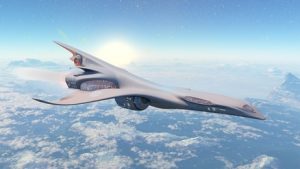The airline industry is one of the world’s largest polluters. Not only does the industry contribute huge amounts of greenhouse gases, but planes also pump out these gases in the worst possible place. Research has shown that releasing these chemicals into the upper atmosphere is actually far worse for the environment than releasing the same amount of chemicals at ground level would  be. If it continues to grow at its current rate, the traditional airline industry is therefore unsustainable. In order for air travel to remain a feasible option in the future, scientists need to come up with a viable alternative to traditionally-fuelled planes. Here are some of the projects that scientists are currently working on.
be. If it continues to grow at its current rate, the traditional airline industry is therefore unsustainable. In order for air travel to remain a feasible option in the future, scientists need to come up with a viable alternative to traditionally-fuelled planes. Here are some of the projects that scientists are currently working on.
Traditional Hybrid Planes
Thanks to the growing popularity of hybrid cars, hybrid planes are also being considered. These planes will mainly be powered by traditional fuel sources, but adaptations will be made to them to help to reduce the amount of fuel that is consumed during the course of a flight. Energy auditors are in the process of assessing all of the areas where energy is wasted during a flight. This information is being used to help to develop technology which harnesses wasted energy.
With aeroplanes, drag and resistance play a huge part in increasing the amount of fuel that is needed to get the plane from A to B. Scientists are excited about technology which will allow planes to reduce this resistance and to harness some of the forces which are exerted on planes during the course of a flight.
Electric Planes
There are various ideas for electric planes currently in the pipeline. One of the most promising styles takes inspiration from plug-in hybrid vehicles. These SUGAR (Subsonic Ultra Green Aircraft Research) planes would theoretically run, in part, off of batteries which had been charged up at the airport terminal using power from the national grid.
In order to get enough power for takeoff and a controlled landing, the plane would require a traditional fuel source, but once the plane had reached cruising altitude, the plane’s main power source could be switched to an electric battery. These would power the plane almost silently. It is thought that this could reduce traditional fuel consumption by as much as 70%. However, electric batteries are known to offer sub-par performance at high altitudes, so scientists are working to develop ways to alleviate this concern without increasing the weight of the plane.
There are also concerns that if plane batteries were integrated (rather than removable), charging-up the battery could hugely increase turnaround time at the airport.
Hydrogen Hybrids
Easyjet have recently announced plans that they will be working with developers to trial a hydrogen cell hybrid plane. These planes will use hybrid technology to harness the waste energy produced by the aircraft’s brakes. Slowing an aircraft down produces huge amounts of waste energy because of the size and speed of the plane. At present, these hydrogen cells are not expected to produce enough power to propel the plane whilst it is in flight, however; they should help to power the plane whilst it is taxiing or parked-up at the gate.
Easyjet also hopes that water produced as a by-product of these hydrogen cells will also be able to be used to flush the toilets on the plane. They have suggested that, chemically, this water should be absolutely pure and ready for passengers to drink, although extensive testing would be required before it was declared fit for human consumption. The company is hoping that this could help to reduce their fuel consumption by around 50,000 a year across their entire fleet. At today’s prices, that would equate to savings of millions of pounds. Easyjet are expected to begin trailing their hydrogen cell system in the next few years.
Solar Planes
Solar planes harness energy from the sun and then convert this energy into electricity which is used to propel the plane. Working solar planes have been created; however these aircrafts are all light aircrafts. One of the challenges so far has been that the panels cannot produce enough energy to power the plane, unless the weight of the plane has been reduced to a base level. It will be difficult to put this into practice without huge improvements in the efficiency of solar panels. It is not currently feasible to run an airline off of just solar power because the passengers and their luggage would add too much weight into the equation.
Major industry experts, including NASA, are continuing to work on alternative and supplementary fuel sources for planes. We should expect to see some of the most promising developments taking effect in 2030, after extensive testing of technologies have been conducted. Airline travellers may have to get used to the sound of silence whilst they are in flight!






